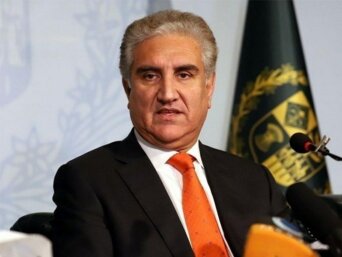- About
- Topics
- Picks
- Audio
- Story
- In-Depth
- Opinion
- News
- Donate
- Signup for our newsletterOur Editors' Best Picks.Send
Read, Debate: Engage.
| topic: | Peace and Reconciliation |
|---|---|
| located: | Afghanistan, Pakistan |
| editor: | Shadi Khan Saif |
It would be utterly naïve to expect peace in the life of war-weary Afghans and tranquility for those in neighbouring Pakistan if the two countries continue on the path of undeclared war as they have been for decades.
With the deep-rooted mistrust between Kabul and Islamabad reaching new heights amid the withdrawal of international forces from Afghanistan, fears arise that the undeclared proxy war will not only cause more havoc but transform into a full-blown armed conflict that would engulf the entire region.
Take, for instance, the latest bitter exchange of words between the top diplomats of the two countries, both of whom got carried away in the heat of the moment without showing maturity and wisdom to prioritise peace and harmony over jingoism and ill-perceived policy of offensive strategic depth.
Last week, the young Afghan National Security Adviser Hamdullah Mohib pointed to the existence of the ‘Heera Mandi’ red-light district in Pakistan during a public rally to discredit the Islamic Republic of Pakistan’s alleged support for the Taliban who claim to be on ‘Jihad’ (holy war) in Afghanistan, where he said no such ‘brothels’ or other un-Islamic places exist.
Acknowledging the frustration of Afghans over Pakistan’s alleged support for Taliban insurgents (who are charged with a string of deadly assaults) was an obviously undiplomatic and desperate move from a responsible senior diplomat.
Shah Mehmood Qureshi, Pakistan’s top diplomat who could have easily downplayed this public speech by Mohib as it was mainly aimed at a domestic audience, took notice and issued a counter statement warning of harm to the peace process, which clearly indicated Islamabad’s motives for utilising its leverage over the Taliban when it it deems it suitable to do so, not a sincere goodwill for ultimate peace.
Otherwise, why would an Afghan official’s outburst at Pakistan in such a public setting would move away the Taliban from the peace negotiations?
Thousands of lives have been lost, resources wasted and opportunities for improving the lives of hundreds of millions of people of this region have been missed because of this decades-long rift.
Sadly, ideals of mutual respect, collective benefits and freedom have been marred by an ever-strengthening nationalist narrative that has been promoted by narrow-minded politicians and military figures.
What Pakistan and Afghanistan really need is a lesson or two from the history of ties between Germany and France that were once engaged in devastating wars, but later mended their ties to lay the foundations of European integration.
The key to the success of the historic Élysée Treaty of friendship between France and Germany, signed on 22 January, 1963, was mutual respect and close consultation between Berlin and Paris on all important issues.
With Islamabad and Kabul sticking to their firm stances on matters related to each other, very little can be achieved towards realising an EU-like model of free travel, trade and, above all, exchange of culture and ideas.
The historic Grand Trunk Road extended by Sher Shah Suri (1486–22 May 1545), the founder of the Sur Empire in North India, still exists, stretching from Western Bengal in India all the way to Kabul in Afghanistan via Pakistan. Alas, it is no longer used to connect people.
The distance between Kabul and Islamabad is less than 300 miles, but common men and women in these two neighbouring countries feel generations apart. Those fearing that friendship in the region would harm their interests should ask themselves - what have the French and Germans lost from their friendship?
Image: Express Tribune.

